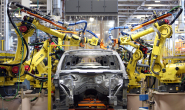Analysis

May 15, 2022
Toyota Cuts May Production on Parts Shortages, Warns About June
Written by David Schollaert
Toyota North America has slashed its May production by roughly 30,000 vehicles, with more reductions in June still possible because of ongoing global microchip and parts shortages, a company spokesperson said.
The move was just one of a string of production cuts among North American automakers.
![]() “Toyota’s North American plants continue to face intermittent production delays due to supply chain disruptions,” she said. “We estimate a reduction of approximately 30,000 vehicles in May.”
“Toyota’s North American plants continue to face intermittent production delays due to supply chain disruptions,” she said. “We estimate a reduction of approximately 30,000 vehicles in May.”
The North American subsidiary of Japan-based Toyota Motor Corp. said the company is working to minimize the impact of the semiconductor shortage. But the supply chain remains fluid, which could result in more cuts in June.
The Toyota spokeswoman did not specify which plants or models would be impacted. The situation can change quickly because of the fluid nature of chip and parts allocations, she said.
All told, Toyota’s North American operations have slashed a total of 187,000 vehicles from production schedules in 2022 – including May’s reductions. And the company has cut more than 500,000 vehicles since last August because of chip and parts shortages.
Toyota wasn’t the only automaker cutting production.
Honda’s North American operations cut production during the week of May 9 and are expected to do so again the week of May 16. The company declined to provide information on specific facilities or models.
Other automakers are running as usual this week after production outages last week. Stellantis and Ford had outages last week.
Stellantis, the European parent company of Chrysler, took downtime at its Windsor, Ontario, assembly plant from Wednesday, May 11, through Friday, May 13. The three-day outage was not microchip-related but resulted from a parts shortage at an external supplier, a company spokeswoman said.
Windsor produces four minivan models: the Chrysler Pacifica, Pacifica Hybrid, Chrysler Voyager, and the Chrysler Grand Caravan.
“Stellantis continues to work closely with our suppliers to mitigate the manufacturing impacts caused by the various supply chain issues facing our industry,” she said. “As the situation remains very fluid, we are continuing to carefully monitor and make production adjustments as necessary to minimize additional production impact.”
The outage at the Canadian facility was in addition to a week-long production outage at Chrysler earlier in the month of some high-demand SUVs.
Ford Motor Co. also took downtime last week because of the chip shortage.
The Dearborn, Mich.-based automaker took a week-long assembly outages at its plants in Louisville, Ky., and Oakville, Ontario, starting on on May 9. Louisville produces the Ford Escape and Lincoln Corsair. Oakville builds the Ford Edge and Lincoln Nautilus.
“The global semiconductor shortage continues to affect Ford’s North American plants — along with automakers and other industries around the world,” a Ford spokeswoman said in a statement. “Behind the scenes, we have teams working on how to maximize production, with a continued commitment to building every high-demand vehicle for our customers with the quality they expect.”
By David Schollaert, David@SteelMarketUpdate.com






